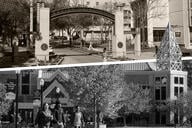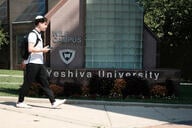You have /5 articles left.
Sign up for a free account or log in.
Academic freedom at religious institutions has always been a vexed and complex subject. Many religious colleges assert that they have academic freedom, while also requiring professors to sign statements of faith in which they subscribe to a certain worldview -- and there is not necessarily a public attempt to reconcile these principles.
One evangelical Christian college has tried to change the conversation – reframing limitations on inquiry implied by signing a statement of faith, for instance, as opportunities.
“Christian colleges and universities offer the freedom to pursue spiritual and religious truths,” explained Vicky R. Bowden, a professor of nursing who chaired the academic freedom task force at Azusa Pacific University, an "interdenominational" institution in California. “We feel that this is a freedom and it’s not usually associated with or enjoyed officially in secular academic institutions and we wanted our document to be able to articulate that.
“Why are we perceiving that it’s limiting when, indeed, who we are is freeing both faculty and the university as a whole to pursue knowledge in light of who we are, in the Christ-centered perspective?” asked Bowden, who also directs Azusa Pacific’s Honors Program.
Azusa Pacific’s Board of Trustees approved a new statement on academic freedom in January, Bowden said, after a multi-year process to review and then revise the institution’s policy in light of its Christian mission. The Faculty Senate had already approved the new policy in late 2007, Bowden said (the senate's moderator did not respond to e-mail and phone messages Friday.)
Both statements, as well as some background information on "the path to a new policy" can be found here.
The old statement at Azusa Pacific was much more bare-bones, citing higher education's seminal "1940 Statement of Principles on Academic Freedom and Tenure," as well as that statement's “limitations clause." The clause allows for limitations on academic freedom “because of religious or other aims of the institution,” so long as they are clearly disclosed, in writing, upon hiring.
The revised statement is much more explicit about what those limitations are, although it doesn’t frame them as such, but instead as unique opportunities (in the revision, the word “limitations” does not appear, as it does in the first). The new statement reads, in part: "Azusa Pacific University seeks to maintain an academic community in which faculty are free to engage in rigorous scholarly inquiry and expression within an intellectual context shaped by the evangelical Christian tradition. In addition to this freedom, Azusa Pacific University seeks to pursue scholarly inquiry and expression in a way that extends and enriches the academic disciplines out of the unique resources provided by our institution’s identity.
“Thus, at Azusa Pacific University, academic freedom is defined both by the commonly accepted standards of the academy and by those commitments articulated in the documents that are central to the university’s identity as a Christian university. These documents articulate the central commitments which shape the academic community, and thus the practice of academic freedom, at Azusa Pacific University: a belief in God as the creator of all things, in Jesus Christ as Savior and Lord, in the Holy Spirit as teacher and guide, in Scripture as God’s authoritative and infallible revelation, and in the Christian community as an expression and vehicle of God’s redemptive work in this world.”
The statement then lists a number of principles that draw heavily from the 1940 statement, issued jointly by the American Association of University Professors and what's now the Association of American Colleges and Universities.
As for what would happen if a scholar’s inquiry led him or her to convert to a non-Christian religion, Bowden said academic freedom matters become moot. “Because they couldn’t sign the statement of faith and we have to sign a statement of faith when we sign the contract every year.
“Our document begins with this is who we are, and because this is who we are and you’ve agreed to be here because this is who we are – remember everyone at AZU has chosen to be here because of who we are – then these are your freedoms within the identity of the institution,” Bowden said.
Gregory F. Scholtz, associate secretary and director of the AAUP's Department of Academic Freedom, Tenure, and Governance, said that while the organization does “grudgingly accept” clearly delineated limitations on academic freedom imposed by religious institutions, “That is not something that we recommend or endorse, that is putting limits on academic freedom for religious purposes.
“In short, as long as there’s full disclosure, as long as everyone knows what the rules are from the beginning, we’re not typically going to object. The real question with academic freedom though is, if you’re going to place limitations on it, how far can you go in placing limitations on it before you end up in a place where you no longer have much academic freedom to speak of?”
While Azusa Pacific's revised policy on academic freedom drops the language of limitations, "If you look at the revision," Scholtz said, "there are a couple of things that indicate that they are invoking this limitations clause." The most obvious is the articulation of the five central commitments of the university (stated above).
Scholtz, who previously taught at Wartburg College, a Lutheran institution in Iowa, said he's familiar with the argument that religious colleges offer unique freedoms to explore religious truths. “There’s some truth to it, in a way, but I’m not sure it has anything to do with academic freedom per se. It has to do with who’s the majority, who’s the minority.”




